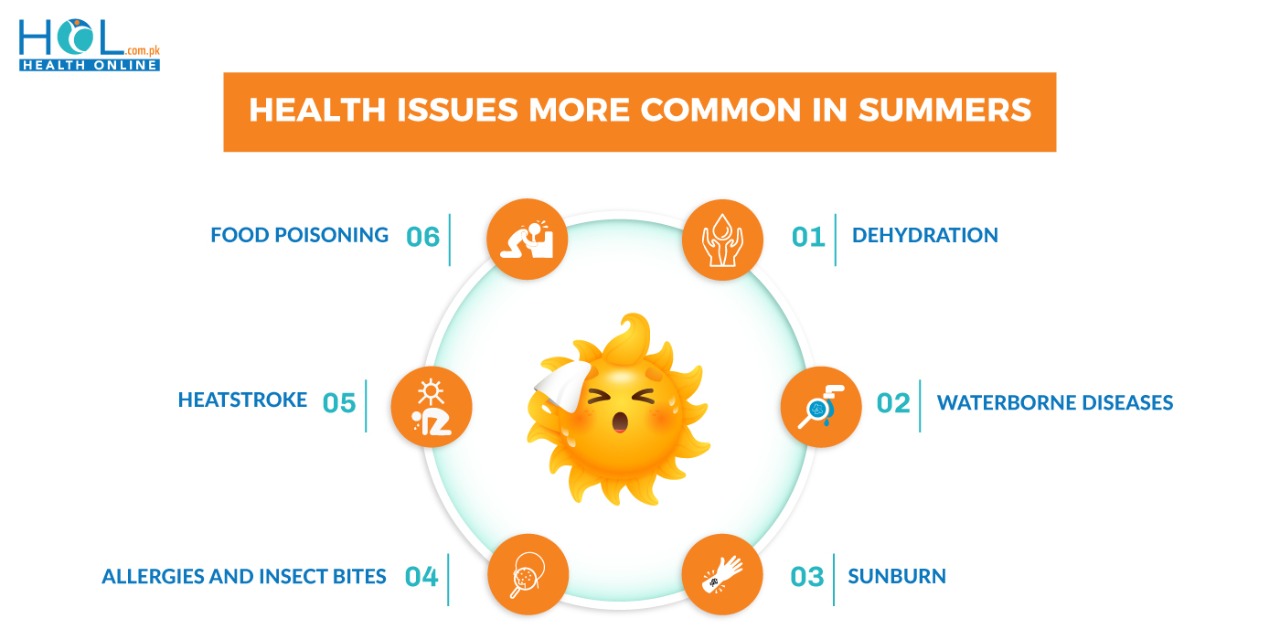For most of us, summer is all about enjoying the outdoors before winter. Warm weather and sunshine tends to have a mood-boosting effect on the majority of people, there are certain health issues that are more common in summers that the change of seasons can usher in.
Given the hot weather, and the surplus of time spent enjoying outdoor activities — especially in the water — there are certain infections and illnesses you are more prone to contracting than during the colder seasons.
Not to forget, tick, flea, and mosquito season are all in full swing throughout the summer months which can easily transfer different diseases/viruses from person to person.
Fortunately, most of the health issues that commonly arise and increase in frequency during the warmer months are preventable to a certain degree.
Today, we’re looking at a few of the most common summer illnesses so you can prepare for the hotter months before they arrive.
1-DEHYDRATION AND HEATSTROKE:
Many times you may have found yourself in a situation when you go for an outing with your family and friends, and you somehow forget to carry water bottle. Isn’t it common? Facing this situation several times may lead to lack of fluids in the body which can cause you to feel dizzy, leave you with a dry mouth, and even cause serious medical conditions. Your body’s inner temperature goes to high level and causes the body to excrete more sweat in an attempt to cool itself down.
Hot weather, coupled with dehydration, can lead to heat exhaustion and, eventually, heatstroke. That can make your core body temperature rise, and cause nausea, severe headaches, confusion, rapid breathing, and more.
Heat exhaustion can be reversed by getting out of the heat, drinking fluids, removing tight or insulating clothing and resting, heatstroke is much more serious.
2- SUNBURN:
Have you ever spent a day outdoors in the middle of July? Did you find that the skin on your shoulders, scalp, and knees was red, sensitive and hot to the touch afterwards? Then you probably know about Sun burns. You may not think of sunburn as a serious medical issue but sunburn can actually cause second degree burns leading to extremely painful blistering. Individuals with pale, freckled skin are more likely to experience serious burns than individuals with darker skin. However, everyone needs to protect themselves from sunburn by applying skin creams and lotions, preferably with SPF and keeping out of direct sunlight. You may consider wearing a hat, sunglasses, and you must try to stay at home during the hot days.
3- FOOD POISONING:
Between 90 and 110 degrees Fahrenheit — the perfect weather conditions for bacteria to grow on food products hence food borne diseases increase. Moreover, summers are best for going out for picnics and vacations, etc. and likewise, it commonly involves eating junk, unhealthy food, or pre-cooked meals off the shelf which may have been kept outside for a long time. The problem with eating outside is hygiene; pre-cooked meals, junk food, etc. can contain several bacteria, virus, etc.
Vomiting, abdominal pain, diarrhea, a fever, and headaches indicate food poisoning. These symptoms can range from mild to severe; food poisoning will usually pass on its own at home, but in some cases, it may be serious enough that you should seek medical attention.
Avoiding street food can solve many problems. Refrigerating food properly and maintaining your hygiene are also complete solution for avoiding food poisoning.
4-WATER BORNE DISEASES:
Who doesn’t like to take a dip and splash around at the canal during warmer months? Though it may be part of the summer fun, it’s important to be aware that there are many waterborne illnesses you can contract. Cholera, diarrhea and other intestinal diseases may pose greater effect due to continue rise in temperature hence facilitating bacterial growth. Studies show, waterborne agents can also cause respiratory illnesses, as well as soft tissue conditions.
The Centers for Disease Control recommend safety precautions for prevention of illness related to water recreation:
- Adults and children with diarrhea should not use swimming pools, hot tubs or water parks
- Shower with soap and tap water before swimming or getting into a hot tub and, again, afterwards
- Wash your hands thoroughly after using the toilet, before re-entering the water
- Avoid swallowing water
- Don’t swim in warm, stagnant water or use poorly maintained hot tubs or pools
5- ALLERGIES AND INSECT BITES:
Ticks are a big threat during the summer months, with their activity peaking from May-July.Pollen, mold and insect stings are common allergy culprits during the summer months. Insect bites can cause mild symptoms, like itching and swelling around the area. Sometimes they lead to a severe allergic reaction. Your throat may feel like its swelling shut, and your tongue might swell. You could feel dizzy, nauseated, or go into shock. This is an emergency, and you’d need medical help right away. If you know you have allergies that spike in the summer, make sure to have your prescribed medications on-hand when you go outside.
And even if you don’t have a bite-related allergy, it’s important to seek medical attention for any bites that are suspicious-looking or feel irritated for extended periods of time.
Summer is the season to spend time with your family, enjoy life, and appreciate the beauty of nature. But, keep in mind that personal safety, health, and security is paramount. You have to be very careful to protect yourself and your family from any hazards.


